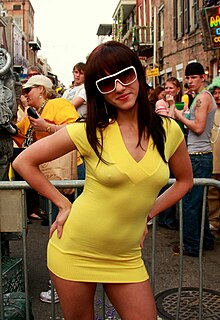| Revision as of 05:51, 29 April 2017 editInternetArchiveBot (talk | contribs)Bots, Pending changes reviewers5,388,432 edits Rescuing 2 sources and tagging 0 as dead. #IABot (v1.3beta8)← Previous edit | Revision as of 09:59, 10 June 2017 edit undoSyced (talk | contribs)Extended confirmed users, Pending changes reviewers6,013 edits fashion illustration, as seen at https://ja.wikipedia.org/%E3%83%9C%E3%83%87%E3%82%A3%E3%82%B3%E3%83%B3Next edit → | ||
| Line 1: | Line 1: | ||
| {{For|the pizzeria located in Brooklyn|Juliana's Pizza}} | {{For|the pizzeria located in Brooklyn|Juliana's Pizza}} | ||
| ] | |||
| '''Juliana's''', also known as '''Juliana's Tokyo''' (ジュリアナ東京), was a ]ese ] in that operated in ], ], ]<ref>Brand, ''Tokyo Night City'', p. 34.</ref> in the early 1990s. It was famous for its dance platforms, on which ] dressed in "bodycon" ({{Nihongo|abbr. (]): "body conscious"|ボディコン|bodikon|"sexually flattering clothing"}}<ref>]'s ], .</ref><ref>Chaplin, Sarah. ''Japanese Love Hotels: A Cultural History''. Routledge contemporary Japan series, 15. London: Routledge, 2007, p. 135. ISBN 978-0-415-41585-9, ISBN 978-0-203-96242-8.</ref>) ] would congregate, as amateur ] (professionals were also employed).<ref>{{schilling-pop-culture|p=76-78}}</ref> The club was produced by Masahiro Origuchi<ref>Kawakami, "Survivors: two approaches to survival in Japan's unkind economy".</ref><ref>Trends in Japan, "Disco Icon Sets Out To Conquer Nursing Care".</ref> for the British leisure services group Wembley PLC, and ], the Japanese ] (now part of ]).<ref>Schilling, ''The Encyclopedia of Japanese Pop Culture'', p.77.</ref> | '''Juliana's''', also known as '''Juliana's Tokyo''' (ジュリアナ東京), was a ]ese ] in that operated in ], ], ]<ref>Brand, ''Tokyo Night City'', p. 34.</ref> in the early 1990s. It was famous for its dance platforms, on which ] dressed in "bodycon" ({{Nihongo|abbr. (]): "body conscious"|ボディコン|bodikon|"sexually flattering clothing"}}<ref>]'s ], .</ref><ref>Chaplin, Sarah. ''Japanese Love Hotels: A Cultural History''. Routledge contemporary Japan series, 15. London: Routledge, 2007, p. 135. ISBN 978-0-415-41585-9, ISBN 978-0-203-96242-8.</ref>) ] would congregate, as amateur ] (professionals were also employed).<ref>{{schilling-pop-culture|p=76-78}}</ref> The club was produced by Masahiro Origuchi<ref>Kawakami, "Survivors: two approaches to survival in Japan's unkind economy".</ref><ref>Trends in Japan, "Disco Icon Sets Out To Conquer Nursing Care".</ref> for the British leisure services group Wembley PLC, and ], the Japanese ] (now part of ]).<ref>Schilling, ''The Encyclopedia of Japanese Pop Culture'', p.77.</ref> | ||
Revision as of 09:59, 10 June 2017
For the pizzeria located in Brooklyn, see Juliana's Pizza.
Juliana's, also known as Juliana's Tokyo (ジュリアナ東京), was a Japanese discothèque in that operated in Shibaura, Minato, Tokyo in the early 1990s. It was famous for its dance platforms, on which office ladies dressed in "bodycon" (abbr. (wasei-eigo): "body conscious" (ボディコン, bodikon, "sexually flattering clothing")) clubwear would congregate, as amateur go-go dancers (professionals were also employed). The club was produced by Masahiro Origuchi for the British leisure services group Wembley PLC, and Nissho Iwai Corporation, the Japanese general trading company (now part of Sojitz).
The club "Disco Queen" in chapters 18, 19, and 21 of the rugby manga No Side by Ikeda Fumiharu (池田文春) is a reference to Juliana's, down to the white feather fans used by the dancers.
See also
- Herve Leger—the fashion house founded by the creator of the body-con dress
Notes
- Brand, Tokyo Night City, p. 34.
- Jim Breen's WWWJDIC, ボディコン.
- Chaplin, Sarah. Japanese Love Hotels: A Cultural History. Routledge contemporary Japan series, 15. London: Routledge, 2007, p. 135. ISBN 978-0-415-41585-9, ISBN 978-0-203-96242-8.
- Schilling, Mark (1997). The Encyclopedia of Japanese Pop Culture. Weatherhill. pp. 76–78. ISBN 0-8348-0380-1.
- Kawakami, "Survivors: two approaches to survival in Japan's unkind economy".
- Trends in Japan, "Disco Icon Sets Out To Conquer Nursing Care".
- Schilling, The Encyclopedia of Japanese Pop Culture, p.77.
- ノーサイド ( Error: {{nihongo}}: text has italic markup (help), ("Nō Saido")) volume 3, pp. 32–3, 35, 66–68, 111–123. ISBN 4-08-875070-5.
- PRISMS: The Ultimate Manga Guide, No Side. Accessed 10 August 2008.
- Fujino, Chiya. "Her Room". In Ozeki, Ruth, and Cathy Layne. Inside and Other Short Fiction: Japanese Women by Japanese Women; with a foreword by Ruth Ozeki; compiled by Cathy Layne, p. 144. Tokyo: Kodansha International, 2006. ISBN 4-7700-3006-1. Accessed 10 August 2008.
References
- Associated Press. "Juliana's craze ceases", September 1, 1994. Accessed 10 August 2008.
- Brand, Jude. Tokyo Night City. Rutland, Vermont: Charles E. Tuttle Company, 1993. ISBN 0-8048-1896-7.
- Kawakami, Sumie. "Survivors: two approaches to survival in Japan's unkind economy: meet the fighter and the surfer - H.I.S. president Hideo Sawada and Goodwill Group CEO Masahiro Origuchi". Japan, Inc., December 2002. Accessed 10 August 2008.
- Schilling, Mark. "Juliana's" in The Encyclopedia of Japanese Pop Culture. New York: Weatherhill, 1997. ISBN 0-8348-0380-1.
- Sterngold, James. "A Night on the Town in Tokyo". The New York Times, October 18, 1992. Accessed 10 August 2008.
- Trends in Japan. "Disco Icon Sets Out To Conquer Nursing Care: Former Club Producer Ventures Into New Territory", June 30, 2000. Accessed 10 August 2008.
35°38′47″N 139°45′12″E / 35.64639°N 139.75333°E / 35.64639; 139.75333
Categories: